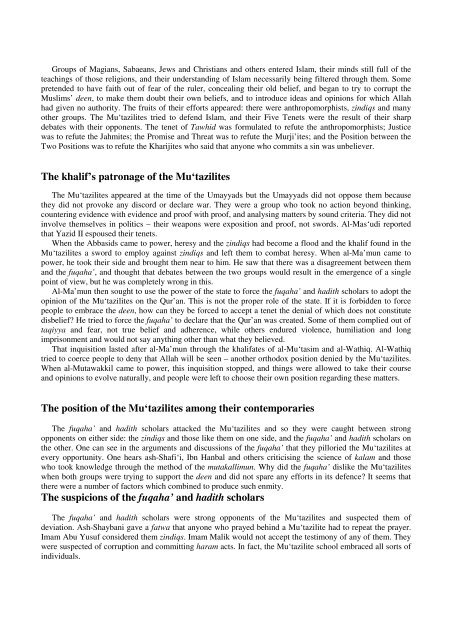Create successful ePaper yourself
Turn your PDF publications into a flip-book with our unique Google optimized e-Paper software.
Groups of Magians, Sabaeans, Jews <strong>and</strong> Christians <strong>and</strong> others entered Islam, their minds still full of the<br />
teachings of those religions, <strong>and</strong> their underst<strong>and</strong>ing of Islam necessarily being filtered through them. Some<br />
pretended to have faith out of fear of the ruler, concealing their old belief, <strong>and</strong> began to try to corrupt the<br />
Muslims’ deen, to make them doubt their own beliefs, <strong>and</strong> to introduce ideas <strong>and</strong> opinions for which Allah<br />
had given no authority. The fruits of their efforts appeared: there were anthropomorphists, zindiqs <strong>and</strong> many<br />
other groups. The Mu‘tazilites tried to defend Islam, <strong>and</strong> their Five Tenets were the result of their sharp<br />
debates with their opponents. The tenet of Tawhid was formulated to refute the anthropomorphists; Justice<br />
was to refute the Jahmites; the Promise <strong>and</strong> Threat was to refute the Murji’ites; <strong>and</strong> the Position between the<br />
Two Positions was to refute the Kharijites who said that anyone who commits a sin was unbeliever.<br />
The khalif’s patronage of the Mu‘tazilites<br />
The Mu‘tazilites appeared at the time of the Umayyads but the Umayyads did not oppose them because<br />
they did not provoke any discord or declare war. They were a group who took no action beyond thinking,<br />
countering evidence with evidence <strong>and</strong> proof with proof, <strong>and</strong> analysing matters by sound criteria. They did not<br />
involve themselves in politics – their weapons were exposition <strong>and</strong> proof, not swords. Al-Mas‘udi reported<br />
that Yazid II espoused their tenets.<br />
When the Abbasids came to power, heresy <strong>and</strong> the zindiqs had become a flood <strong>and</strong> the khalif found in the<br />
Mu‘tazilites a sword to employ against zindiqs <strong>and</strong> left them to combat heresy. When al-Ma’mun came to<br />
power, he took their side <strong>and</strong> brought them near to him. He saw that there was a disagreement between them<br />
<strong>and</strong> the fuqaha’, <strong>and</strong> thought that debates between the two groups would result in the emergence of a single<br />
point of view, but he was completely wrong in this.<br />
Al-Ma’mun then sought to use the power of the state to force the fuqaha’ <strong>and</strong> hadith scholars to adopt the<br />
opinion of the Mu‘tazilites on the Qur’an. This is not the proper role of the state. If it is forbidden to force<br />
people to embrace the deen, how can they be forced to accept a tenet the denial of which does not constitute<br />
disbelief? He tried to force the fuqaha’ to declare that the Qur’an was created. Some of them complied out of<br />
taqiyya <strong>and</strong> fear, not true belief <strong>and</strong> adherence, while others endured violence, humiliation <strong>and</strong> long<br />
imprisonment <strong>and</strong> would not say anything other than what they believed.<br />
That inquisition lasted after al-Ma’mun through the khalifates of al-Mu‘tasim <strong>and</strong> al-Wathiq. Al-Wathiq<br />
tried to coerce people to deny that Allah will be seen – another orthodox position denied by the Mu‘tazilites.<br />
When al-Mutawakkil came to power, this inquisition stopped, <strong>and</strong> things were allowed to take their course<br />
<strong>and</strong> opinions to evolve naturally, <strong>and</strong> people were left to choose their own position regarding these matters.<br />
The position of the Mu‘tazilites among their contemporaries<br />
The fuqaha’ <strong>and</strong> hadith scholars attacked the Mu‘tazilites <strong>and</strong> so they were caught between strong<br />
opponents on either side: the zindiqs <strong>and</strong> those like them on one side, <strong>and</strong> the fuqaha’ <strong>and</strong> hadith scholars on<br />
the other. One can see in the arguments <strong>and</strong> discussions of the fuqaha’ that they pilloried the Mu‘tazilites at<br />
every opportunity. One hears ash-Shafi‘i, Ibn Hanbal <strong>and</strong> others criticising the science of kalam <strong>and</strong> those<br />
who took knowledge through the method of the mutakallimun. Why did the fuqaha’ dislike the Mu‘tazilites<br />
when both groups were trying to support the deen <strong>and</strong> did not spare any efforts in its defence? It seems that<br />
there were a number of factors which combined to produce such enmity.<br />
The suspicions of the fuqaha’ <strong>and</strong> hadith scholars<br />
The fuqaha’ <strong>and</strong> hadith scholars were strong opponents of the Mu‘tazilites <strong>and</strong> suspected them of<br />
deviation. Ash-Shaybani gave a fatwa that anyone who prayed behind a Mu‘tazilite had to repeat the prayer.<br />
<strong>Imam</strong> <strong>Abu</strong> Yusuf considered them zindiqs. <strong>Imam</strong> Malik would not accept the testimony of any of them. They<br />
were suspected of corruption <strong>and</strong> committing haram acts. In fact, the Mu‘tazilite school embraced all sorts of<br />
individuals.














